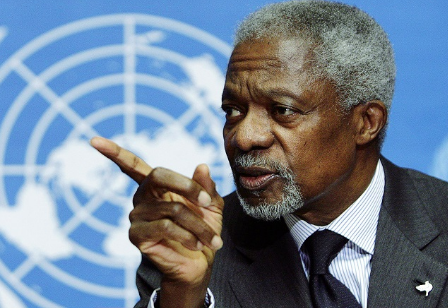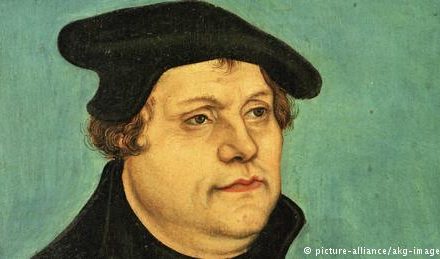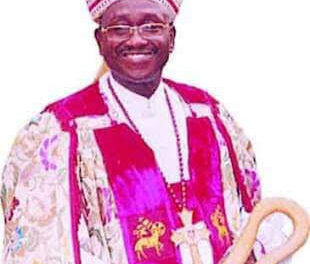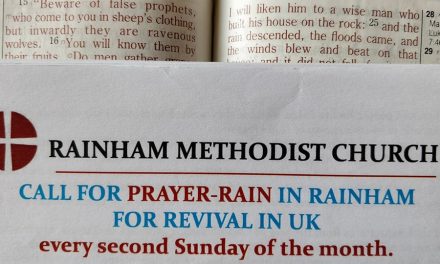“In many ways, Kofi Annan was the United Nations” – Antonio Guterres.
“You can take the man out of the U.N., but you can’t take the U.N. out of the man” – Kofi Atta Annan
The death of Kofi Atta Annan, a charismatic global statesman, diplomat and the first black African to become United Nations Secretary General early Saturday 18th August at 80, a date and month that marks the 500th Anniversary of the birth of the Africa to America transatlantic slave trade is a message to the world. The significance of the slavery tragic event resonates with the significant of the doctrine and role of Kofi Annan, the 2001 Nobel Peace Prize winner. Born on Friday 8th April, 1938 in the Kofandros section of Kumasi, Ghana, he married a Nigerian woman, Titi Alakija in 1965. They separated in the 1980s before Annan later met Nane Lagergren, a Swedish lawyer and they married in 1984.
Annan, a career diplomat with aristocratic style, political savvy and an administrator in the United Nations was the 7th secretary-general and served two terms from 1st January, 1997, to December 31st 2006. Annan by beating Amara Essy succeeded Boutros Boutros-Ghali as the U.N. Secretary-General. As a mentor, Annan raised and developed ‘a generation of U.N. officials including current Secretary-General Antonio Guterres and outgoing U.N. human rights chief Zeid Ra’ad Al-Hussein. Guterres explained that, Annan ‘rose through the ranks to lead the organisation into the new millennium with matchless dignity and determination.’ Guterres said, “In many ways, Kofi Annan was the United Nations,” and I am glad to add that the United Nations is about the doctrine of Kofi Annan. After Annan handed the reins of the U.N. to Ban Ki-moon, he did not retire, he kept working through his Foundation on African issues especially, the legacy of transatlantic slave trade, human rights, global warming and governance issues. According to Annan, “You can take the man out of the U.N., but you can’t take the U.N. out of the man.”
What is the doctrine of Kofi Annan? Annan doctrine is about global dynamic and aggressive engagement in peacekeeping and fighting the legacy of the transatlantic slave trade – poverty, racism, inequality, and elite wealth across the continents. Annan doctrine is about setting the framework for UN ‘21st– century response to mass atrocities and its emphasis on human rights and development.’ Annan in one of his speeches in 2013 summarised the essence of his doctrine. He said, “Beneath the surface of states and nations, ideas and language, lies the fate of individual human beings in need … Answering their needs will be the mission of the United Nations in the century to come.” Annan doctrine, called the “Responsibility to Protect” is about ‘principle to head off genocide, crimes against humanity, ethnic cleansing and war crimes.’
Edith Lederer, the Associated Press chief correspondent at the United Nations explained that Annan left the United Nations better. According to Lederer, Annan ‘left the United Nations far more committed than it had been, to combating poverty, promoting equality and fighting for human rights – and until his death … he was speaking out strongly for nations working together to solve problems and worried about the rise of nationalism.’ As part of his vision, his launching of the U.N. Millennium Development Goals in 2000 ‘to cut extreme poverty by half, promote equality for women, ensure every child has a primary school education, reduce maternal and child mortality, and halt the spread of AIDS – all by 2015’ is yet to be achieved at 2018. It is hope that that the expanded list of U.N. Sustainable Development Goals for 2030 that adds issue such as climate action, affordable and clean energy, and promoting peace and justice will not be hampered by global division. Annan recently warned that ‘whether our task is fighting poverty, stemming the spread of disease or saving innocent lives from mass murder, we have seen that we cannot succeed without the leadership of the strong and the engagement of all.’ He said, “No nation can make itself secure by seeking supremacy over all others. We all share responsibility for each other’s security, and only by working to make each other secure can we hope to achieve lasting security for ourselves.”
The doctrine and death of Annan especially on the exact day that marks the 500th Anniversary of the birth of the Africa to America transatlantic slave trade summons the world leaders to self examination. Annan doctrine and his death calls the world leaders to comprehensive implementation of the “Responsibility to protect” the people and head off the world’s worst crimes, especially, the legacy of transatlantic slave trade. In such a time when many people worldwide had lost trust in political and corporate leaders, the doctrine and death of Annan calls for leadership renewal. Using the description of Annan by Timothy Wirth, president of the United Nations Foundation, the world need “a saint-like sense about him,” a new generation of Annan with passion and burden for the poor to overcome ‘an unjust world economy, world disorder, and widespread contempt for human rights and the rule of law.’
Please, remember the family in prayers.











Recent Comments